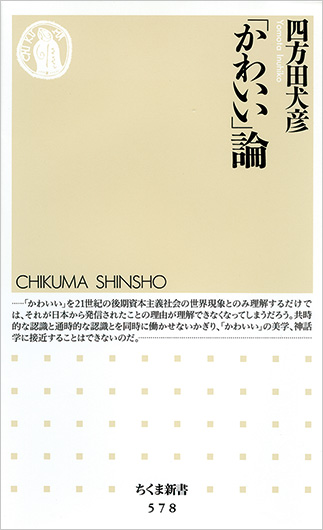
CULTURE
“Kawaii” ron
[The Theory of Kawaii]
Chikuma Shobō (Chikuma Shinsho), 2006. 208 pp. ¥740. ISBN 978-4- 480-06281-9.
Also published in: Chinese (traditional and simplified characters) and Korean
The Japanese adjective kawaii (cute) is applied to a number of globally popular Japanese characters, like Hello Kitty, Pokémon, and Sailor Moon. What does kawaii mean, and why have kawaii Japanese characters become so popular? Taking a look at these questions by going back in history and examining the meaning of the word, the author skillfully delves into one root of Japanese culture.
According to Yomota, the word kawaii dates back to the eleventh-century work Makura no sōshi [trans. The Pillow Book of Sei Shonagon]. It was used in Kabuki and popular novels in the Edo period (1603–1868) and has been kept alive by modern writers like Dazai Osamu, refined to the point where it represents a unique aesthetic. The author also notes that the elements of kawaii include ugliness and a hint of the grotesque in addition to beauty. He analyzes how university students use the word via surveys of students at Meiji Gakuin University, where he has taught film history, and Akita University, where he previously lectured. He also looks into the background of how kawaii culture made its way overseas. In short, this is a very interesting discourse on Japanese culture. (UY)
According to Yomota, the word kawaii dates back to the eleventh-century work Makura no sōshi [trans. The Pillow Book of Sei Shonagon]. It was used in Kabuki and popular novels in the Edo period (1603–1868) and has been kept alive by modern writers like Dazai Osamu, refined to the point where it represents a unique aesthetic. The author also notes that the elements of kawaii include ugliness and a hint of the grotesque in addition to beauty. He analyzes how university students use the word via surveys of students at Meiji Gakuin University, where he has taught film history, and Akita University, where he previously lectured. He also looks into the background of how kawaii culture made its way overseas. In short, this is a very interesting discourse on Japanese culture. (UY)

Translation rights inquiries
The Sakai Agency, Inc.
1-58-4F Kanda Jimbō-chō, Chiyoda-ku,
Tokyo 101-0051
Email: info@sakaiagency.com


